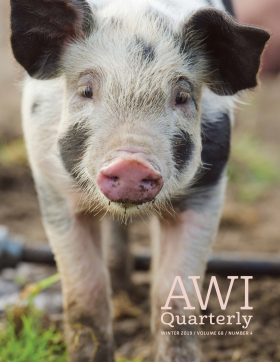Volume
68
Number
4

About the Cover
Nine billion land animals are raised and slaughtered for food in the United States each year, yet the laws protecting these animals are strikingly limited. No single federal law expressly governs the treatment of farm animals. Meanwhile, more than two dozen states have enacted farm animal welfare laws and regulations over the past 20 years. AWI recently conducted a first-of-its-kind in-depth analysis of how well those laws are being enforced. The answer: not very well.